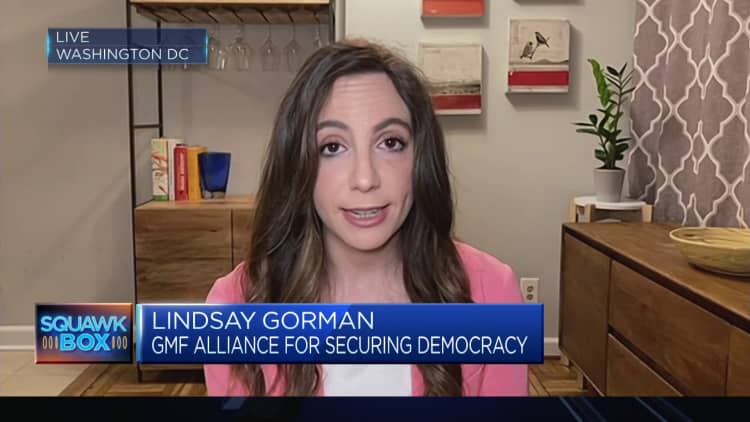
While political scrutiny continues to intensify on the widely popular short video app TikTok in the U.S. and across the world, Lemon8 owned by ByteDance is going viral.
Jakub Porzycki | Nurphoto | Getty Images
Chinese tech giant ByteDance is pushing another social media app in the U.S. — even as its flagship short video app TikTok faces a possible ban stateside.
While it could be part of a business strategy for ByteDance, a new product to replace TikTok isn’t the best solution either, analysts told CNBC.
“It’s certainly interesting timing. It seems like ByteDance is pushing Lemon8 as a potential alternative to TikTok,” said Lindsay Gorman, senior fellow for emerging tech at the German Marshall Fund.
In March, ByteDance invited creators onto its “new Lemon8 platform” before it officially rolls out in the U.S., while citing the success of its “sister company TikTok,” according to media reports.
Lemon8, a blend of Instagram and Pinterest, was first launched in Japan in early 2020. The lifestyle app which focuses on health, wellness and beauty has quickly climbed the charts in the U.S.
According to analytics firms data.ai, Lemon8 jumped 693 positions to become the second most downloaded lifestyle app in the U.S. in the last 30 days, bumping Zillow to third place while Pinterest maintained its first position.
Lemon8 has accumulated 17 million downloads globally since its launch, according to Apptopia.
You could see this as the competitive move of a company that’s trying to expand into different consumer markets and segments with more image-based and longer-form written content as opposed to only short-form videos.
Lindsay Gorman
Senior fellow, German Marshall Fund
“Some of the algorithms that are used in Lemon8 are similar to or exactly the same as the recommendation algorithms in TikTok, which of course, would make both of those apps tremendously popular because they feed you what you want to see and so on,” said Glenn Gerstell, senior advisor at Center for Strategic and International Studies.
‘A business strategy’
Lemon8’s rise in popularity comes as U.S. lawmakers consider whether the Chinese-owned parent company of TikTok, ByteDance, needs to divest its stake in the popular short video app which has come under immense scrutiny.
In March, U.S. lawmakers questioned TikTok CEO Shou Zi Chew in Congress to get answers on TikTok’s ability to operate independently of Chinese influences on its parent. The congressional questioning did not appear to allay lawmakers’ concerns.
Analysts like Gorman say that promoting Lemon8 aggressively could be seen as a “competitive move” by the company as it tries to “expand into different consumer markets and segments with more image-based and longer-form written content as opposed to only short-form videos.”
Lemon8 will initially focus on areas such as fashion, beauty, health and wellness.
Gabby Jones | Bloomberg | Getty Images
“It certainly is a business strategy. [There’s] nothing wrong with having competing products around the world,” said Gerstell.
But Lemon8’s links to ByteDance and TikTok will come under the radar of U.S. regulators too, especially as the app continues to rise in popularity.
“If Lemon8 gets shut out of the U.S. market, they have still got [millions of] people around the world who could be users of this app,” pointed out Gerstell, who said Lemon8 has already seen success in Japan.
“From a business strategy’s point of view, I don’t see a lot of downsides,” said Gerstell.
ByteDance didn’t respond to CNBC’s request for comment.
It might give them a fallback in case something gets hurt on TikTok but I don’t see it as generating a solution for ByteDance in this regard.
Glenn Gerstell
Senior adviser, Center for Strategic and International Studies
Lemon8 could also serve as an alternative for content creators if TikTok ever gets banned in the U.S., said both Gorman and Gerstell.
“The fact that we’re getting a dedicated marketing push onto Lemon8 may be an effort to move creators onto a platform if TikTok is facing a ban,” said Gorman, who also acknowledged it’s “easier said than done” — and that shifting 150 million TikTok users in the U.S. from one app to another is no small feat.
Not a solution
Creating another app to replace TikTok is not a quick solution for ByteDance, the analysts said. Chinese apps will continue to be scrutinized by the U.S. as tensions with China are not dying down.
“It might give them a fallback in case something gets hurt on TikTok but I don’t see it as generating a solution for ByteDance in this regard,” said Gerstell.

As Lemon8 continues to get more popular, it really speaks to the need for U.S. regulators to come up with a comprehensive framework to understand the risks of Chinese internet apps and address them before they spiral out of control, said Gorman.
“This problem will just proliferate. It’s a bit like Russian nesting dolls, right? You open TikTok, then you get another app. You open that app, you get another app,” said Eric Noonan, CEO of cybersecurity compliance service provider CyberSheath.
“So we really need a framework to deal with this. Otherwise, we will be playing Whack-A-Mole till the end of time.”
